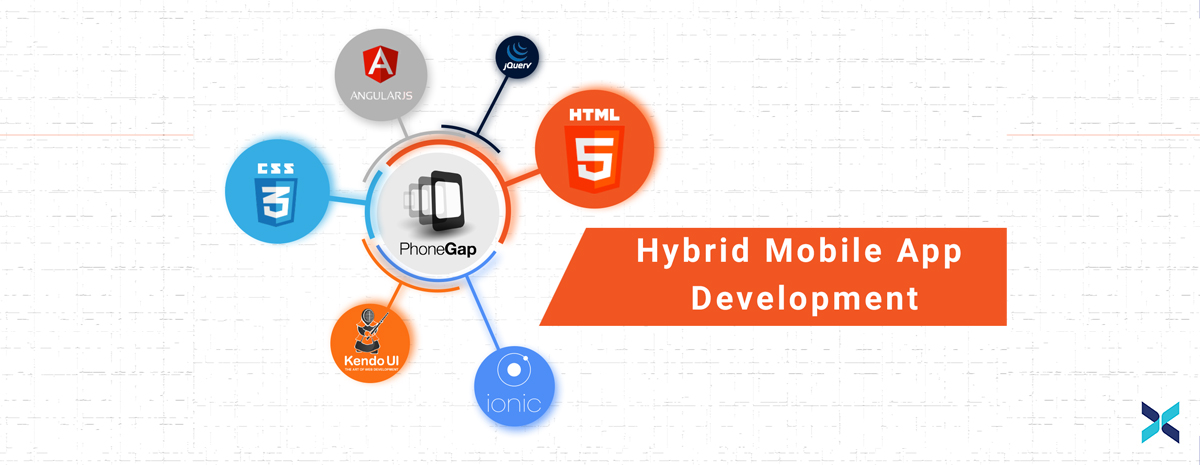Why You Should Consider Hybrid App Development?
The pandemic has fast-tracked the inevitable digital transformation globally. The consumers have evolved, calling for shifts in processes and systems. From schools to offices to shopping, everything has gone online. As a mobile app development company, you need to keep check on the app usage. It is suggested that a lot of people are using mobile apps for daily functions, which means you have to think mobile-first before scheming through any solution.
According to popular sources, there will be roughly 7Mn mobile users globally by 2021. (source:statista.com) There has been a 23.3% surge in the mobile app downloads during the pandemic. (source:sensortower.com) a surge in mobile app downloads during the pandemic. These apps include food delivery, productivity, remote working, and other miscellaneous apps that aided people in their daily routine.
All these stats point towards the growing need for mobile apps. It also shows an insight into the increasing number of apps being developed to enhance experiences. Among the many types of apps, hybrid apps are also doing the rounds. Many businesses prefer developing hybrid solutions against native apps as they can be run across operating systems.
Let's take a quick look at what hybrid apps are and why businesses prefer them over iOS or Android app solutions.
What is a hybrid mobile app?
Hybrid apps contain the best of both worlds- mobile and web. Akin to the mobile apps, you can download and install them to your device locally. In addition, it is majorly scripted using technologies that are most often used to create web applications.
These apps are enclosed inside a container and leverage the technologies such as HTML, CSS, and JavaScript using the browser engine specific to the device. Generally, web applications cannot use native capabilities such as a camera. However, in the case of hybrid app development, this is possible. With the help of a web to a native abstraction layer, they can utilize the device's capabilities and enhance experiences.
Advantages of Hybrid Mobile App
It is essential to answer the specific question of why hybrid mobile apps are necessary for your business. What makes them tick against a native app?
1. Cost-efficient solutions
Hybrid app development takes lesser time as compared to a native app. In addition, the app can be created once and deployed across the operating systems, which makes it useful for users across the OS.
When you develop a native app, you have to keep up with the native OS updates. This means regular maintenance and timely upgrades. This will add to the resource cost as well as other development-related costs.
When you create a hybrid mobile app, you tune down these costs. You don't have to pay for maintenance or updates, which means these apps are cost-effective for your business.
If you plan to go live on both OS, i.e. iOS and Android, then the hybrid app will be friendly in your pockets.
2. Better App Reach
The mobile app niche is a cluttered segment. Several players are swimming in the same pool. You need to aim for better visibility and reach, which is why you should go with hybrid apps. It is important to choose a good mobile app development company to partner with to unleash the hidden potential of a hybrid app.
It promises more reach as compared to native apps. With the native apps, you can reach the audience of the particular app store. However, hybrid apps can help you reach people with a smartphone and a desire to use an app like yours. This reach will help you further your business through apps.
3. Boosts App Experiences
The app experience is enhanced by the combination of a delightful UI and an equally accessible UX. With hybrid apps, you can offer the UI and UX that supports users' interests and movement across the device.
Apart from being usable, the apps ape themselves to suit the device and screens. As a result, you get seamless and frictionless experiences irrespective of the device.
The way the UI is designed for the hybrid solutions makes it easy to get approvals on the app store.
4. Accelerated Development
The overall timeframe to develop hybrid mobile apps is shorter as compared to developing native app solutions. This is because your code once and deploy it across the mobile operating systems. In addition, you use standard technologies such as JavaScript and HTML to code the app solutions, which means you invest fewer hours into actual development and reap the benefits faster.
5. Native-like Performance
When it comes to performance, you get native-like speed and usability with the hybrid apps. The overall feel and responsiveness are akin to how a native app would be. In some cases, the hybrid apps are faster and more accessible than the Android or iOS app solutions. One of the primary reasons for the superior performance can be attributed to the fact that they don't depend on the network.
6. Low Maintenance Solutions
As an organization, we always prefer solutions that are low on maintenance and high on performance. With hybrid solutions, you get to enjoy the benefits of both sides. With hybrid apps, you don't need to create multiple versions of the app to match the OS updates. It is akin to updating the web page in real-time.
The Apps that Went Hybrid
There are some well-known hybrid apps that almost everyone is using in the present times. Don't believe us? Let's check out some names.
1. Twitter
Twitter uses the hybrid app approach. You can see the reliability and accessibility of hybrid solutions in how Twitter manages heavy loads of traffic and its data. Not only has Twitter managed to maintain the performance required, but it has also seldom reported data issues or security breaches.
2. Gmail
If you are a Gmail user, you know how reliably accessible, and supremely usable the mobile app is. Would you believe it if we said that this app had been developed using the hybrid approach? It has clearly defined the hybrid and native features which can help improve the app usability. This app has been added to the list of top hybrid apps that offer excellent performance.
3. Instagram
If you want to know how engaging a hybrid app can be, you need to look at Instagram as your example application. Instagram can support rich media and offer seamless interactions with hybrid app solutions. In addition, it can help media and data, even in the offline mode.
Some of the other interesting hybrid apps include Slack, Whatsapp, and Uber. All of them showcase the high-performance abilities of hybrid app solutions. It also showcases how these apps can store massive data without causing friction.
Things to Consider Before Taking the Hybrid Approach
As a key decision-maker, you ought to consider a few pointers before taking to the hybrid app approach.
1. Do a complete feature feasibility check
It is essential to list your requirements and identify what you want to add to your mobile app. Before you approach a partner for hybrid app development, you need to have this list. It should include all the features that you cannot ignore or remove from the list.
Once you have a list of the features, it is time to check the feasibility of adding them using the hybrid app approach. Certain features may take up a lot of work if you want to add them using HTML to the app. these features can get easily added using the native app development approach.
At this point, check how much it costs to include these features, the resource time, and other factors. It will give you a good idea of whether or not a hybrid is feasible for your business app needs.
2. Consider whether or not you want to include interaction capabilities
Does the app model you have in mind include interaction abilities? For instance, a gaming app would need interaction abilities. However, a streaming app like Netflix can do without interaction.
How much does the hybrid app approach help with interaction capabilities? Does it enhance the capacity or lower the performance?
If you want to include real-time interaction, the hybrid approach may not offer the kind of experience you are expecting. As a result, you may want to go with a native development approach for these apps.
3. Check the hybrid framework that works for you
When you have finally decided to move ahead with the hybrid app development approach, you might want to consider the framework that best fits your business. You must choose the framework that matches your feature selection and the capabilities you want to achieve.
You don't want to go about changing the framework sometime soon. So, select a framework that will exist for at least a few years. It is also essential to check the overall cost of implementation and maintenance before choosing the framework.
4. Putting forth your app speed requirements
When you develop a mobile app for your business, you cannot compromise on the speed requirements. If your app is slow, the users will automatically move onto the competition’s app.
Therefore, it is essential to consider the app’s speed before choosing to go with hybrid development. If a hybrid approach can match your speed needs and capability, you can move ahead with this method. Else, you might want to code for a single operating system by going with native app development.
A slow app will not only be rejected by the app user but also by the app store.
Conclusion
The hybrid app development approach promises speed, low maintenance, reduced costs, and higher gains. However, before you start opting for the course, check on all the apps that have used this method and succeeded.
Answer these questions before you zero down on this approach:
5. Have these apps used any of the features I plan to use for the app?
6. Have they successfully managed to induce high-end features?
7. Is this app high on speed and performance?
8. Will I be compromising the interface and experience when choosing a hybrid?
Once you have the answers to these questions, you will make a firm decision and move ahead from there.
If you are planning a mobile app for your business, now is the time to move with the idea. First, conduct a market check for your vision and then consider the feasibility of your planning features. Once done with these points, choose a partner mobile app development company that can help you convert your idea into an accessible and usable app solution.
 Jignen Pandya
Jignen Pandya





